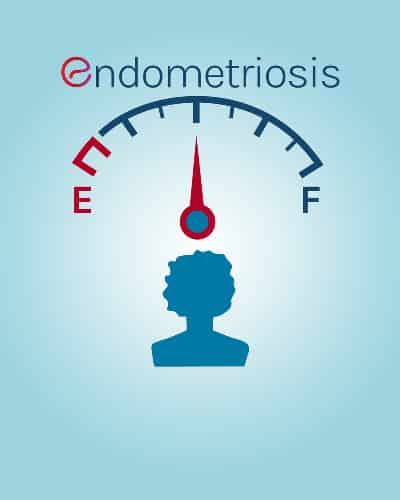Endometriosis and Fatigue

Endometriosis is a disorder that affects approximately one in 10 women of reproductive age. It is characterized by the growth of endometrial-like tissue in regions outside the uterus. This may include the ovaries, fallopian tubes, bladder, and pelvic cavity. One of the characteristic symptoms of endometriosis is fatigue. However, it may not be immediately apparent as being due to endometriosis.
How does endometriosis cause fatigue?
Fatigue is a near-continuous state of weariness that reduces a person’s energy, motivation, and concentration. It can have an impact on a person’s emotional well-being as well.
Chronic fatigue, in general, is known to affect women more than men, particularly those with a history of chronic pelvic pain. Unlike general tiredness, this is a feeling of constant exhaustion. It may affect patients to the point that they are unable to complete any activity. It can also be a sign of an impending flare-up of endometriosis symptoms.
One of the main causes of endometriosis-related fatigue is the body’s effort to combat the extraneous endometrial tissue. During this process, the body produces high levels of signaling molecules that promote inflammation. These can contribute to the further growth of endometrial tissue.
Other associations with fatigue include poor mental status, higher pain levels, high occupational stress, and depression.
How common is it in women with endometriosis?
Although fatigue is a well-documented symptom, endometriosis-related fatigue has not been extensively studied and characterized until recently. Primarily, this may be due to the clustering together of pain and fatigue symptoms by both patients and doctors.
A 2018 multi-center observational study (NCT02511626) involving 1,120 participants with endometriosis and 560 healthy women found that more than half of the women with endometriosis reported frequent fatigue. This was the case even after considering other factors such as pain, insomnia, occupational stress, body-mass index, depression, and motherhood.
Another recent study involving 25 women with endometriosis found that 52% and 28% of women with moderate and severe endometriosis, respectively, reported a significantly higher degree of fatigue compared to the others.
In a study involving 22 participants with confirmed endometriosis, most participants indicated that they experienced severe fatigue during the first few days of their period. Few of them reported it during other times such as ovulation.
What is its impact on quality of life?
Fatigue can impact performance in daily activities such as self-care, household chores, socializing, relationships, and professional life.
It can also result in personality changes in women with endometriosis as it may affect activities that keep them happy.
Combined with the fact that women with endometriosis are also prone to anxiety and depression, endometriosis-related fatigue can have a negative impact on a woman’s overall quality of life.
How to manage fatigue?
Certain lifestyle changes can help manage fatigue in women with endometriosis.
Since the inflammatory response is known to play a role, switching to an anti-inflammatory diet, or endo diet may help reduce fatigue. An endo diet typically is dairy-free, gluten-free, and has low FODMAP (fermentable oligosaccharides, disaccharides, monosaccharides, and polyols) levels.
Techniques such as mindfulness and yoga can help cope with endometriosis symptoms. Mindfulness can help develop a positive outlook and reduce levels of pain and depression that contribute to fatigue.
Maintaining a proper sleep pattern by practicing sleep hygiene may increase sleep quality and in turn, reduce fatigue. Ensuring a fixed sleep schedule, turning off digital devices well before bedtime, and creating a calming environment are some of the ways to practice good sleep hygiene.
It is also important to be wary of signs of anxiety and depression and address them at the first opportunity.
Socializing with family and friends, establishing an exercise routine, ensuring adequate rest, and staying well-hydrated, can help you stay motivated and improve your overall quality of life.
Fatigue often goes unaddressed during consultations with the healthcare provider. Therefore, it is important to keep a track of fatigue episodes and how they affect your daily activities. Having them jotted down in a personalized endo pain diary can help. It can also offer better insights to your healthcare provider.
The surest way of alleviating fatigue, when associated with endometriosis, is to treat the underlying root cause of it by treating endometriosis with laparoscopic excision surgery.
Get a Second Opinion
Our endometriosis specialists are dedicated to providing patients with expert care. Whether you have been diagnosed or are looking to find a doctor, they are ready to help.Our office is located on 872 Fifth Avenue New York, NY 10065.
You may call us at (646) 960-3080 or have your case reviewed by clicking here.